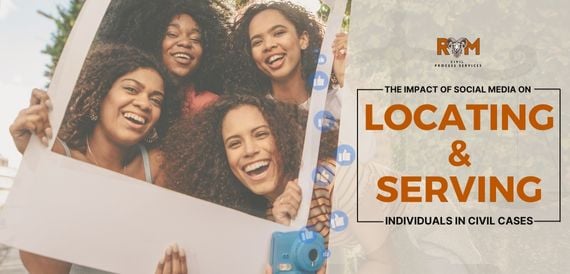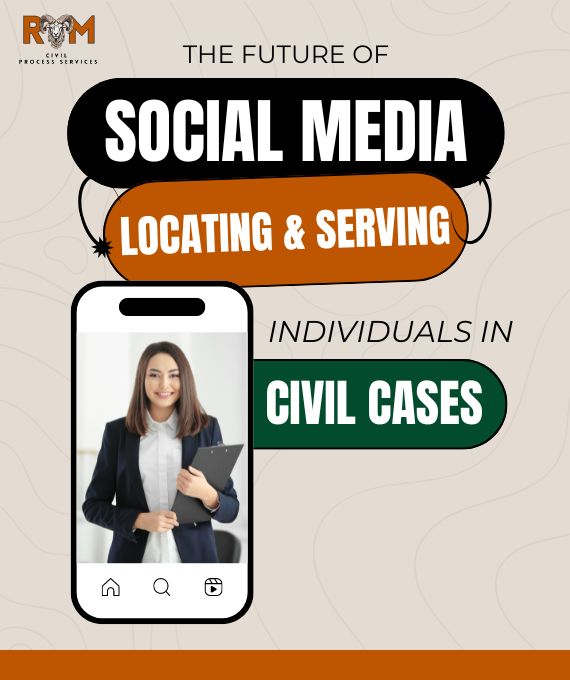Validating Evidence : Lawyers must diligently verify the authenticity of social media evidence amidst the prevalence of fake accounts and manipulated posts to ensure its admissibility in court.Ethical Considerations : Lawyers face the delicate task of balancing the imperative to gather pertinent information with the obligation to respect individuals' privacy rights, presenting ethical challenges in handling social media evidence responsibly.
The Impact of Social Media
on Locating and Serving Individuals in Civil Cases
Introduction
Social media's integration into the legal system presents a complex duality. On one hand, it facilitates locating individuals and unearths a wealth of potential evidence through public posts. However, this newfound power raises concerns about privacy breaches, the manipulation of public opinion through strategic online narratives, and the potential for social media content, intended for a limited audience, to be misconstrued as legal evidence with unintended consequences. Navigating this new reality requires a delicate balance, ensuring the legal system leverages this powerful tool ethically and responsibly.

How Social Media Evidence is Used in Civil Cases
The Challenges and Ethical Considerations of Using Social Media in Civil Cases
The Future of Social Media in Locating and Serving Individuals in Civil Cases
-
Technological Advancements AI and machine learning will streamline the analysis of social media data for efficient locating.
-
Expanded Platforms New social media platforms and global usage will provide broader sources for information gathering.
-
Adaptation & Opportunity Legal professionals must adapt to these changes, seizing opportunities to enhance their investigative techniques.
-
Strategic Utilization Thoughtful and strategic use of social media will strengthen cases and ensure fair outcomes in civil litigation.

Resources and Tools for Leveraging Social Media in Civil Cases
Online Databases
Tap into online databases for comprehensive profiles and background information on individuals involved in lawsuits, facilitating efficient investigation and case preparation.
Social Media Monitoring
Harness AI-powered tools to sift through social media data, identifying relevant posts, interactions, and trends essential for case analysis and strategy development.
Legal Research Platforms
Utilize comprehensive platforms to uncover relevant case law, precedents, and statutes related to social media evidence, facilitating informed legal strategy development.
Training and Education
Engage in ongoing training programs to stay abreast of the evolving social media landscape, enhancing proficiency in ethical and strategic utilization for legal purposes.
Digital Investigation
Collaborate with specialized firms for comprehensive support in gathering, preserving, and analyzing social media evidence, ensuring effective legal support.
Data Privacy Compliance
Implement tools to ensure strict compliance with data protection regulations while handling social media evidence, safeguarding individuals' privacy rights.
Expert Consultation Services
Seek guidance from experienced social media experts to effectively navigate challenges in civil cases, optimizing resources and strategies.
Collaborative Platforms
Engage in forums where legal professionals share insights and best practices on social media evidence, fostering effective case management collaboration.
Finding People for Lawsuits Made Easy with RAM Civil Process Services
Finding people for lawsuits can be a headache. Social media can help, but it's a confusing world. RAM Civil Process Services is here!
We Do It Right
We follow the rules and make sure everything is legal and ethical.
We Know the Law
The legal system can be tricky, but we understand it well.
We Get Results
We quickly locate the people you need, fast and easy.
Conclusion
Social media has undeniably transformed the way we locate and serve individuals in civil cases. Its impact on the legal system is far-reaching, offering new opportunities for legal professionals to streamline their processes and access valuable evidence. However, with these opportunities come challenges and ethical considerations that must be carefully navigated.
By understanding the role of social media, adhering to best practices, and staying updated with the evolving landscape, legal professionals can harness the power of social media to enhance their investigative techniques and improve the overall efficiency of civil cases. As technology continues to advance, the influence of social media in the legal system will only grow stronger, shaping the future of civil litigation.
Locate individuals quickly and efficiently
Let's Discuss How Social Media Can Help Your Case. Contact RAM Civil Process Services Now!